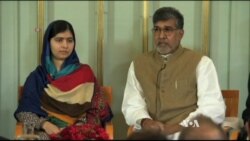The Indian and Pakistani winners of this year’s Nobel Peace Prize have called on political and religious leaders to make children’s rights a priority, and to improve the lives of millions of children caught in a cycle of poverty, child labor and lack of education.
The Peace Prize winners told an Oslo news conference that the Nobel Committee’s decision has put a global spotlight on children’s issues.
Seventeen-year-old Malala Yousafzai from Pakistan was nearly killed by the Taliban two years ago for her advocacy for girls’ education. Sixty-year-old Kailash Satyarthi of India founded a charity that frees bonded child laborers and provides them with training and education.
Malala had invited the prime ministers of the two countries to Wednesday’s award ceremony, but they have not responded.
“I would have thought of it as a big opportunity to ask them to have good relationships and to make education together their top priority and work on it together,” she said.
Satyarthi issued a broader appeal.
“I would definitely urge all the religious leaders in the world, and all the religions in the world, that if you really want to worship God and want to see a better world, begin with the children,” he said.
Satyarthi’s charity operates in 144 countries and has rescued thousands of children, many of them in his home country, India. He said Tuesday the Nobel Peace Prize has already brought welcome attention on the plight of poor, uneducated and enslaved children worldwide.
“When we are talking here, and addressing this press conference, millions of children cannot talk in freedom, cannot enjoy the freedom and smile as a child. We have to work for them,” said Satyarthi.
Malala Yousafzai campaigned for girls’ education in northern Pakistan, after the Taliban moved into the area and closed schools. An alleged Taliban militant shot her in the head.
“There are so many countries where children are not asking for any iPad or computer or anything else," she said. "What they are asking for is just a book and just a pen. So why can’t we do that? Why can’t we just give a book and a pen? Why can’t we just give a school to children, which can really change their future, really change their world?”
Malala said people like her attacker, who think Islam forbids educating women, were themselves uneducated.
“In Islam, education is not only a child’s right, but it is their duty. There is a hadith from the Prophet that you should get education, you should get knowledge. It’s not just limited to men,” she said.
Much has been made of the fact that the Nobel Committee gave the Peace Prize to an Indian and a Pakistani, a Hindu and a Muslim. On Tuesday, Satyarthi said he considered Malala his daughter. And Malala said just because India and Pakistan had a border between them, they did’t have to hate each other.





